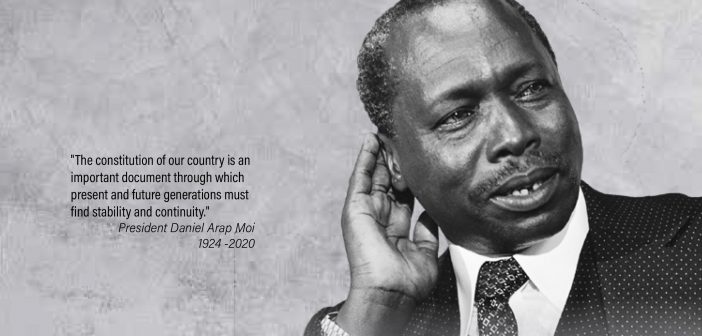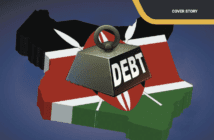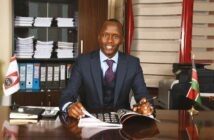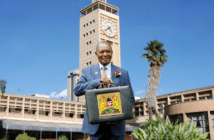By Jim McFie
ICPAK’s connection with President Daniel Toroitich arap Moi
ICPAK’s association with President Daniel Toroitich arap Moi started more than 40 years ago. He became President in 1978 following the death of Kenya’s first president, Jomo Kenyatta. President Kenyatta died on
22nd August 1978. 1978 was not only the year that Moi began his position as the president of Kenya. It was also the year of the birth of the Institute of Certified Public Accountants (ICPAK); its birthday is celebrated on 30th April. But let me take you back a little, because another institution closely linked to ICPAK had come into being earlier.
In 1969, the Kenya Government established the Kenya Accountants and Secretaries National Examinations Board (KASNEB) to provide professional examinations leading to the Certified Public Accountant of Kenya qualification. Prior to this date, a number of Kenyans trained in the UK to become members of one of
the UK Chartered Institutes. A second alternative was to sit the examinations of the Association of Chartered Certified Accountants (ACCA) and to train in Kenya. The first Accountants Act (Chapter
531 of the Laws of Kenya) received Presidential Assent on 1st March 1977 and came into operation on 1st July 1977, by notice in the Gazette. It superseded the previous Accountants (Designations) Act.
It established a Registration of Accountants Board (RAB) and the Institute of Certified Public Accountants of Kenya, and gave legal recognition to KASNEB.
 Mr. S. K. Mbugua was the first Chairman of the Registration of Accountants Board, and over 500 accountants had been registered by 17th November 1978, when the then Vice-President of Kenya, Mwai
Mr. S. K. Mbugua was the first Chairman of the Registration of Accountants Board, and over 500 accountants had been registered by 17th November 1978, when the then Vice-President of Kenya, Mwai
Kibaki, officially inaugurated ICPAK. Immediately following the inauguration ceremony, the first AGM of the new Institute took place. 350 registered accountants attended the inauguration and this meeting at the Kenyatta Conference Centre. Mr. S. K. Mbugua was elected the first Chairman at the meeting. By this date, over 5,000 Kenyans had registered with KASNEB and 70 persons had completed the CPA examinations. Vice-President Kibaki stressed that ICPAK would be expected to promote “a high standard of professional
competence and practice amongst its members . . . acceptable both in Kenya and internationally”.
So although ICPAK was in existence as from 30th April 1978, it could be regarded as having been conceived earlier, but not yet born, that is, being visible to people generally. ICPAK became visible on 17th November 1978, when Mwai Kibaki, who was also the Minister of Finance at the time, performed the official
inauguration ceremony. Immediately after the ceremony, ICPAK had its first meeting and the first chairman was elected.
The accountancy profession continued to prosper during Moi presidency. By 30th September 1979, RAB had registered 686 accountants: 322 had obtained Practising Certificates and the total who had paid their subscription fees was 534. One of the principal reasons for the deregistration of accountants by RAB was the non-payment of annual subscriptions to ICPAK. At 31st December 2002, there were 2,295 paid up members of ICPAK, 848 of whom had practising certificates. Accountants who pass the ACCA examinations
have to pass two examinations (one in Kenya Company Law; another in Kenya Taxation) in the KASNEB system in order to register with ICPAK. Hence during the 24 year period of Moi’s being the President of Kenya, ICPAK’s membership grew from zero to 2,295; the total number at the end of Moi’s presidency was
less than 10% of the membership number today. But it was on that firm foundation that present day ICPAK is built. But just to bring our readers up to date with the present status of ICPAK, let me continue
the story which unfolded during Moi’s term of office as president and for a short period afterwards, but during Moi’s lifetime; although he was not in power, he still wielded much influence over what
happened in Kenya.
A revised Accountants Act was promulgated in 2008. It abolished the Registration of Accountants Board and
replaced it with a statutory body, the Registration and Quality Assurance committee of ICPAK. As at 31st December 2013, 12,650 persons have been registered as CPAs and 2,100 CPAs have been granted
Practising Certificates. A new category of member – the Associate Member – had recently been introduce by ICPAK for persons who have completed the CPA examinations of KASNEB, but who do not have the required three years of practical experience prior to their becoming fully registered members of ICPAK. To 31st December 2013, 225 persons have been admitted to associate membership recognized “the necessity of involving other interested parties in the accounting setting process to widen input and encourage
acceptance and adoption of such standards”. All members of IFAC were ipso facto members of IASC.
ICPAK established a Professional Standards Committee, which had the task of considering whether mandatory accounting standards should be imposed on members. A questionnaire was sent
out to members in 1980. It explained that Standards would be mandatory on all members; since “all auditors of limited companies in Kenya must by law be members of ICPAK, this will ensure that
all company accounts would comply with the provisions of all standards”. If any standard conflicted with Kenya law, representations would be made to the Government to change that law. The syllabus
of the CPA (Kenya) examinations would include the standards and in fact did so. The required wording of the auditors’ report would be changed so as to incorporate the fact that the auditors were of the opinion that the accounts were in compliance with Kenyan Accounting Standards.
During the 24 year period of Moi’s Presidency, ICPAK’s membership grew from zero to 2,295
An Explanatory Foreword to Kenyan Accounting Standards (KASs) was published. This document explained
that, in discharging ICPAK’s obligations as a member of IASC, it would incorporate International Accounting Standards (IASs) into KASs. When an IAS was issued, it would be published by ICPAK for the information of members. It would be compared with Kenyan practice (whether or not covered by a KAS) to determine if
there were significant differences between the two. Kenyan practice would prevail until ICPAK issued a new KAS. Kenyan Exposure Drafts (KEDs) would be issued by ICPAK and comments would be invited by the Professional Standards Committee within a stipulated period which would not be less than three months.
KASs would be published after due regard had been given to representationsreceived.
The first Kenyan Accounting Standard (KAS 1), on Disclosure of Accounting Policies, was published in 1982 and became operative for financial statements relating to accounting periods beginning on or after 1 January 1983. KAS 1 indicated that compliance with its requirements would ensure compliance with IAS 1; this model was followed in the subsequent KAS. 18 Kenyan Accounting Standards were promulgated between 1982 and 1995. A Kenyan Accounting Guideline on Accounting and Reporting Practices of Short Term Insurers was published in August 1997.
The first Kenyan Accounting Standard (KAS 1), on Disclosure of Accounting Policies, was published in 1982 and became operative for financial statements relating to accounting periods beginning on or after 1 January 1983. KAS 1 indicated that compliance with its requirements would ensure compliance with IAS 1; his model was followed in the subsequent KAS. 18 Kenyan Accounting Standards were promulgated between 1982 and 1995. A Kenyan Accounting Guideline on Accounting and Reporting Practices
of Short Term Insurers was published in August 1997.
In spite of the 18 Kenyan Accounting Standards having been promulgated, the profit and loss account of all companies other than banks and insurance companies remained no more than an appropriation
account, with the addition of the “turnover” figure in the case of quoted companies. When IASs were adopted in Kenya, the “full” profit and loss account (or income statement) was introduced for
the first time. Analysts (in particular) saw this as a great improvement in financial reporting disclosure in Kenya.
At the AGM of the Institute held on 26 May 1989, the newly elected Chairman James Muguiyi, noted that ICPAK had now been in existence for just over ten years. He pointed out that 14 Kenyan Accounting Standards and several Exposure Drafts had been issued. “One thing that has been glaringly lacking is the input by both the public and private sectors to whom these standards are supposed to apply. It is my view that these matters are too important to be left solely to the profession to decide” he added. All attempts
to obtain comments on Kenyan Exposure Drafts failed to come to fruition, except from the Nairobi offices of the large international audit firms. A lecturer at the University of Nairobi, the late Mr Mwarania,
pointed out that “the response is so pathetic that one wonders whether there is any need … of circulating Kenyan Exposure Drafts… evening lectures are arranged to explain to members why the standard is being proposed and what its contents are. The audience is composed of mainly the members of the Professional Standards Committee”.
The explanation for this seemingly uninterested attitude amongst the members of the Institute was that qualified accountants were busy producing accounts in their various places of work; they had little time to devote to the theoretical matters of developing accounting standards. Moreover, they had received IASs from the Institute when these had been promulgated and “Kenya is simply rewriting
International Accounting Standards and christening them ‘Kenyan Accounting Standards”, as Mwarania put it. It was inevitable that at some point the Council of the Institute would accept the reality of the situation and decide to adopt IASs in their entirety. This did not occur until 8 years later. In 1997 the
Council made the decision to do so. The Council decided that it would cease developing Kenyan Accounting Standards for a number of reasons. In particular it had become clear to the Council of ICPAK that developing home-grown standards was not putting its limited resources to best use:
“Updating Kenyan Standards to comply with International Standards and to cover areas which are not covered currently is a monumental task. The Institute just does not have the resources, human or financial, to carry out this task to a satisfactory level of proficiency; and even if it did, what purpose would this serve?
Council believes that an effort to update Kenyan Standards will merely reproduce International Standards under a different name. In the circumstances therefore, the resources available to ICPAK could be put
to better use if they were used to interpret International Standards, to assess their implication on local practice and, where necessary, to issue technical bulletins and local guidance on those Standards”.
Kenya adopted International Accounting Standards in full with effect from 1 January 1999. It simultaneously
adopted International Standards on Auditing (ISAs). For all accounting periods commencing on or after 1 January 1999, members of ICPAK are required to prepare the accounts of companies (whether
quoted, public or private), parastatals and organizations such as co-operative societies, partnerships, sole traders, non-trading concerns such as sports clubs and charities, and estates and trusts in accordance
with IFRSs.
Could adopting IAS be viewed as a weakness on the part of ICPAK? ICPAK’s admission that it had not kept KASs up to date with IASs was similar to the position of the accounting profession in a country
as advanced as The Netherlands, which acknowledged in late 1991 that “the current output of CAR (the Council for Annual Reporting – the Raad voor de Jaarverslaggeving) is a problem and a certain
backlog exists. More staff does not seem to be the problem. More international co-operation and using IASC standards as an input to the process seem to be more realistic ways of decreasing the backlog.
International accounting standard setting is a very important ingredient of current national accounting standard setting. International comparability does not seem to be important only for the multinational
companies”. The Netherlands was ranked in the top 5 countries (along with the UK, the US, Canada and Sweden) in a survey of 17 countries’ annual reports studied by an eminent accountant in 1984: annual
reports in the top 5 countries were described as “good” in this study. So Kenya can point to a much more economically developed country which also decided to leave the standard setting process to professional
standard setters. Six years later, all the countries in the European Union adopted IFRSs for the 7,000 quoted companies in the EU, with effect from 1st January 2005 – Kenya beat this group of countries to adoption by six years – which meant that in the period immediately prior to and shortly after 1st January 2005,
Kenyan accountants working in the Big Four audit firms in Nairobi were in high demand in audit firms across Europe, but especially in the UK, Jersey, Guernsey, the Cayman Islands and Bermuda.
It can be seen that many developments in ICPAK took place in the 24 years of Moi’s presidency and many more developments have taken place after this period. Kenya was able to remain at relative
peace during this period as a result of astute leadership.
President Daniel arap Moi died at 5.20 am on Tuesday 4th February 2020. There is a question about the date of his birth. His personal doctor, Dr. David Silverstein, stated at the final funeral service
at Kabarak that President Moi was born in 1917, which would make the President 103 when he died. President Moi himself would celebrate 2nd September as his birthday and claim that he was born in 1924; if this is true, he died at the age of 95. He was the President of Kenya from 22nd August 1978 to 30th December 2002, when he handed over the presidency to Mwai Kibaki, who had been elected a few days
previously. Moi was educated at mission and government schools and became a teacher at the age of 21. As Kenya began to move towards its independence, which occurred on 12th December 1963, Moi
was appointed minister of education in the transitional government. Although he had originally been cofounder and chairman of the Kenya African Democratic Union (KADU), he joined the Kenya African
National Union (KANU) in 1964. That same year Moi was appointed minister of home affairs. In 1967 he became vice-president, and became president on 22nd August 1978 following the death of
Kenya’s first president, Jomo Kenyatta.
We ask God to grant Daniel Moi’s soul eternal peace and strength to his family to improve further what he was able to achieve.
FCPA Dr. Jim McFie is a Fellow of the Institute of Certified Public Accountants of Kenya




